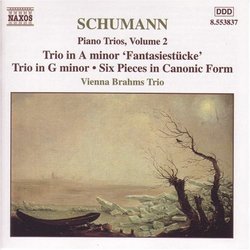| All Artists: Vienna Brahms Trio Title: Schumann: Piano Trios Vol.2 Members Wishing: 0 Total Copies: 0 Label: Naxos Release Date: 3/14/2000 Genre: Classical Styles: Chamber Music, Historical Periods, Classical (c.1770-1830) Number of Discs: 1 SwapaCD Credits: 1 UPC: 730099483728 |
Search - Vienna Brahms Trio :: Schumann: Piano Trios Vol.2
 | Vienna Brahms Trio Schumann: Piano Trios Vol.2 Genre: Classical
|
Larger Image |
CD Details |
CD ReviewsEngaging performances, but the pieces are weak Santa Fe Listener | Santa Fe, NM USA | 06/19/2006 (3 out of 5 stars) "For a great composer, Schumann has only a few works that rank as masterpieces among his chamber music output, principally the Piano Quartet and Quintet. Here, in their second CD of Schumann's Piano Trios, we get assured, relaxed readings from the Vienna Brahms Trio. But the main work here, Trio No. 3 Op. 110, dates from Schumann's drastic mental and physical decline. The first movement has moderate energy and a lovely theme, yet it doesn't develop with the power of imagination that early-to-middle period Schumann has. After that, things go downhill quickly. The slow movement is simple, centered around an almost-memorable melody, but the Scherzo is feeble and the finale downright weird--I defy anyone to figure out what Schumann intended. Likewise, the Fantasiestucke are average works at best, nowhere near Schumann's inspired line of fantasy in his piano music, and the six Pieces in canonic form Op. 56, though not part of the composer's decline, are a bit academic, pleasant at best. I love Schumann, but these works didn't strike me as worth more than one listen." More Great Chamber Music by Schumann JohnL | Alexander, NC United States | 11/16/2001 (5 out of 5 stars) "The Vienna Brahms Trio pick up where they left off, after recording Schumann's Piano Trios Op.63 and 80 (Vol.1). Volume 2 is also well-performed and recorded. Schumann surely wrote some lovely chamber music, as evidenced by the three works here. The Trio in G minor, Op.110, is a work of lyrical beauty. The other two works are equally delightful. No lover of the gifted Schumann would want to do without these modern digital recordings at a bargain price." WORTH KNOWING DAVID BRYSON | Glossop Derbyshire England | 09/06/2009 (5 out of 5 stars) "The music on this disc gets more memorable as the disc goes on, or so I find. First up is the third and last piano trio, dating from Schumann's awful last years. His music from this final period is often considered to be below the standard of what he produced in his prime, and I suppose that is largely true. The cello concerto, for instance, is not the equal of the piano concerto, and this trio is not quite up to its two predecessors. On the other hand it is still a very agreeable piece of music, with real depth to it and with a very engaging and slightly kooky finale marked `mit Humor'.
I would have wanted this trio for my collection, but I suspect I might have been prepared to wait for it if it had not come along with the other two items here, particularly the last one. These are both earlier works, the first of them still calling itself `a trio'. A better guide to what it is comes from the alternative title `Fantasiestuecke'. There are four movements, but they don't constitute a `sonata style' work, more a small suite of separate pieces along the lines of his sets of piano pieces by the same title and other titles. They are maybe not quite equal to the best of the piano works, but they have the mercurial sense about them that I and surely many others love so much in Schumann. However the real gem, for me at least, is the set of six short pieces `in canonic form' that fill the last 17 minutes of this disc. These were written for a strange contraption called a Pedalfluegel, and the arrangement for piano trio that we are given here has been done by Theodor Kirchner. These are really inspired miniatures, and I found the deftness of the canonic counterpoint delightful. I recall that Tovey, whose idea of counterpoint does not tolerate much that is less strict than Bach's and who castigates Mendelssohn's part-writing for shortcomings in this respect, consistently speaks highly of Schumann's. The approach that the Vienna Brahms Trio take to the music is what I would have expected, now that I know their way of doing the first two trios. They do not try to prettify or tart up the music but they play it from the heart, and the execution is meticulous technically. As the music gets more attractive, so do the performances, and I feel real sympathy with Schumann here. There is nothing I would pick out by way of `highlights', this not being the sort of music that does highlights. What you will find here is consistency and reliability, and I don't intend that as faint praise but as a way of saying that these performers have the right idea of what they are doing. The first few paragraphs of the liner note are identical with those in volume 1, and again rightly so as they are just concerned with Schumann's basic background. The recordings were made in Budapest between 1995 and 1996, and I have no complaint with those either. This is not, I dare say, the first record that I would recommend to anyone getting to know the composer for the first time, but his real aficionados will find a good deal of what endears him to us in this hour of music." |

 Track Listings (14) - Disc #1
Track Listings (14) - Disc #1